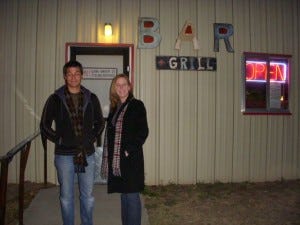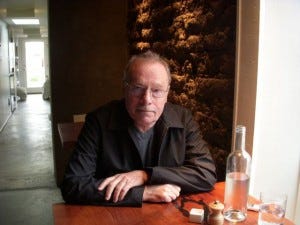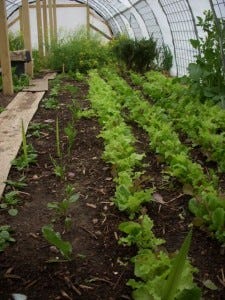A Tale of Two Marfa Eateries
Borunda’s Bar and Grill is Marfa’s oldest restaurant (opened 1887). Cochineal is Marfa’s newest (opened May ’08). Between these two restaurants and their respective restaurateurs lies a gulf as wide as the Texas sky. Much about the quixotic nature of Marfa may be understood by taking a look at them both.
Originally called Tula’s, Borunda’s was started by the eponymous ancestor of present owner/chef Pancho Borunda. In ****, Tula’s niece Carolina Borunda took over the eatery and moved it over a few blocks, at which time it became the Old Borunda. Carolina kept a club hanging over the door to enforce order amongst the clientele when necessary. Today, Borunda’s Bar & Grill occupies the corner of Dean Street (yes, named after local icon James) and Highway 90, but it has to be said that the building’s sheet-metal exterior does not inspire an instant frisson of culinary confidence.
Inside is a large, festive space festooned with old license plates, sports banners, and a pool table. The L-shaped bar is a nice place to belly up to, and when he’s not cooking, Pancho will keep you entertained with tales of the movie companies who tend to set up shop here whenever they come to town, his colorful ancestors, and various motorcycle rides he’s loved. The other night when I was savoring a luscious bean and cheese burrito ($2.50), one of the other (3) bar-proppers turned out to be a French journalist, riding across the country on one of the most beautiful motorcycles I’ve ever seen—a vintage Victoria. He was, in a way, doing what I do and writing about the experience for a French motorcycling magazine (except he started in Daytona Beach and was heading to California; also, he’s riding a sky-blue dream machine and I’m driving a 5-year old Toyota, but there are some similarities). The burger at Borunda’s, he pronounced, was the best burger he’d ever eaten in the U.S.A. He’d consumed many American burgers, evidently, but when Pancho pushed him for comparisons to the French, our new friend David allowed as he had never dined on a burger in his homeland.
I am perplexed by the emptiness of Borunda’s: I’ve visited three times (it’s only open Thursday through Saturday nights, and might, on a whim, be closed on one of those night anyway). The food is good, and cheap, and the atmosphere---provided by Pancho, his wife, their daughter, and their 2-year old grandson, who holds court behind the bar in a playpen, as there is often no one else there---friendly. With the dearth of bars in town, why isn’t this place packed? Pancho doesn’t have an answer for me; he’d love to do more business. So I nosed subtly around town (pretty much everyone knows who I am) and came up with three different opinions/excuses: * A bar with a pool table should serve booze; beer isn’t enough. * A few years ago, at least, "white people didn’t feel welcome there." * Pancho tends to give the cold shoulder to people he himself doesn’t like. I listen and I look, but none of this makes a lick of sense to me. The whole family is real nice to me and the new friends, Noah and Susan, whom I drag in there kicking and screaming. Maybe there’s a secret my newcomer status won't let me in on. What I do know: If you hang your hat for the night at the small, motel-like Riata Inn just east of town on Highway 90, the manager will heartily recommend Borunda’s. I do, too.
Right down Highway 90 and all the way on the opposite side of the spectrum lies Cochineal, the labor of love of two ex-Manhattan restaurateurs, Tom Rapp and Toshi Sakihara. The two owned and cheffed at the upper east side eatery Etats-Unis for just over ten years and garnered much critical acclaim. But then, as it will---and has, for many here---the glitter of New York City began to wear thin. The two conducted interviews with San Miguel de Allende, Santa Barbara, and Ojai, but when they visited Marfa and saw the light, as it were, their new home was a foregone conclusion. “We were blown away,” he said. “We’d never planned to open a restaurant here, but people kept saying we should, and we gave in.” Despite all that early encouragement, the full-time locals who can afford to, and do, dine at Cochineal, are relatively few. So, an ambitious--some might say ahead-of-the-Marfa-curve--place like this depends on tourists and other visitors to thrive. "We’re betting on growth here," Tom says. Growth is a whole ‘nother story in Marfa, of course, because what makes this place special is its out-of-the-way, other-worldly atmosphere. Local opinions on the subject of commercial growth tend to differ widely, with the old, as usual, trying to keep the new at bay. But people will come to Marfa, and they must eat, drink, and sleep somewhere.
The hardest thing, Tom allows, was sourcing the materials and skilled labor to create this serene, warm and earthy, yet minimal-chic space. Waiting for it to happen was hard, too: three years elapsed between the decision to open and the first ethereal soufflé. Most business-owners in Marfa complain that good help is hard to find, but for Tom that was the easy part, and therein lies a dichotomy: Tom and Toshi staffed their place entirely with local kids, “pretty much anybody that came by,” and personally trained them to run the restaurant like a military operation with heart. Tom is like a stern but proud father when he talks about teaching these high-school grads. “They could, if they choose to, continue with this as a permanent career.”
Tom and Toshi take care of all the initial food preparation, spending from 1pm to 6pm in the kitchen every day. Then the staff takes over to grill, sauté, and finish dishes to rigorous standards. The menu always includes a soufflé, and on one night I visited, it was a twice-baked cheese soufflé ( a dish you are more likely to find in London). Eric, a slight, long-haired boy with skin as smooth as milk chocolate, is the soufflé man. I watched him hold the whisk lightly but with a relaxed confidence, while cradling the copper bowl in his other arm; he beat the egg whites, patiently and evenly, until they peaked. As the evening wore on, I could always tell when a soufflé had been ordered (often) because again, the rhythmic drum-beat of the whisk would commence, only just heard, like a back-beat to the soft thrumming of convivial, candle-lit dinner conversation. Eric is also learning dessert-making skills from renowned sweets-master Toshi. If he can come close to reproducing Toshi's legendary date pudding, once the toast of New York and now the belle of Marfa--his career, here or anywhere else, is guaranteed. “They’ve jumped from Dairy Queen to hand-picked micro-greens,” says Tom, with no hint of hubris. Tom serves up all the credit for this transformation to his staff-members themselves.
Two places to tie on the feed-bag, in Marfa. A star-filled universe apart, yet quirkily complementary, just like the schizophrenic nature of the town itself..







